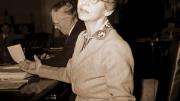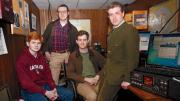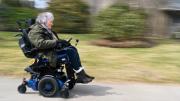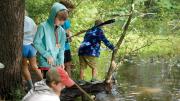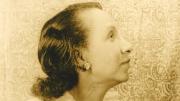One of the most innovative historians of her day, Caroline Farrar Ware, Ph.D. '25, astonished the profession when her dissertation won a $10,000 prize. She had demonstrated that the early cotton mills of New England set the pattern for the future industrial development of the country and also changed the nature of rural life, especially for young women. She was 26, and that was only the beginning of an increasingly distinguished and many-sided career.
"Lina" Ware grew up in Brookline, Massachusetts, in a fond and generous family. At Vassar, pioneer social historian Lucy Maynard Salmon taught her to do careful work and understand that no historian ever knew all there was to know about any subject. Vassar also encouraged graduates to put their learning into action. Ware chose to teach at Bryn Mawr's summer school for women workers, and later at a similar summer program in the South. The rapid progress of her students, whose education had usually ended around sixth grade, cemented her lifelong commitment to workers' education.
A year at Oxford yielded several outstanding papers and a keen, wry understanding of English academic culture before she began graduate work in history in 1923 at Harvard. In Cambridge she met economist Gardiner Means '18, Ph.D. '33, who lived in the same apartment building. As she later told the story, during a car trip to view an eclipse, they began to argue about the definitions of "delta" and "estuary": one thought both referred to water, the other that both meant land. When it turned out each was half right, they decided they could go on together; in 1927 they were married by an illiterate justice of the peace who almost forgot to show up. Though totally different personalities, they were drawn together by their interests, including enthusiasms for analytical thinking, outdoor life, and adventures by bicycle, horseback, and canoe.
Means and his friend Adolf Berle '13, LL.B. '16, would soon startle their field by demonstrating, in The Modern Corporation and Private Property, the fundamental shift in the nature of property--from physical objects to pieces of paper--in the new corporate-industrial society. Meanwhile, Ware's dissertation became a well-reviewed book, yet the only satisfactory job she could find was back at Vassar, where she was soon recognized as a master teacher. In the early 1930s she began writing her second book, Greenwich Village, focusing not on its well-known artist colony but on its multiracial social structure, probing the consequences in one small geographic area that contained immigrants from so many dierent cultures.
In 1933 Means joined FDR's brain trust in Washington, and Ware, after much soul-searching, resigned from Vassar to join him. Again she found university history departments reluctant to hire women. Adaptable and enthusiastic as always, she found a job in the Department of Agriculture and soon became "the person to call" for congressmen and almost anyone else interested in the burgeoning field of consumer protection. She served as a specialist for a number of federal agencies until, in the early 1940s, the government's attention shifted primarily to the war eort.
She was already teaching constitutional history at Howard, the nation's preeminent black university. When Pauli Murray, a second-year law student, asked to audit her class, the two women became good friends. As a two-person civil-rights movement, they organized Howard students for marches and sit-ins and integrated two restaurants. They also set a personal example of ignoring color in their social lives. (In the McCarthy period, Ware was accused by a neighbor of entertaining Negroes in her home.)
A chance invitation in 1947 to lecture on community development in Puerto Rico inspired yet another intellectual adventure, as an adviser to public-spirited women's groups throughout Central and South America. She learned enough Spanish to lecture and write eectively, and a guide to community development that she prepared became a bestseller for the Pan American Union.
Little wonder an admiring niece once described Ware as "the most efficient worker I ever knew." But she also had a gift for friendship and loved putting together people whose interests she thought similar. Most of her letters closed with a pressing invitation to visit, and for many years "The Farm," in northern Virginia--70 acres and a log cabin she and Means bought in 1936--was a favorite haunt of young New Dealers setting out to change the world. Later visitors included diplomats and leaders of all sorts of causes, any of whom might be put to work as what Ware labeled IBUL: "intelligent but unskilled labor." In time, the couple donated all 70 acres as a permanent public park; in the 1960s, a similar concern for nature and new neighbors prompted them to buy Yellowhead Island, o the coast of Maine, and become deeply engaged in eorts to conserve its natural beauty and find ways for local fishermen to earn a better living.
There is much more to Lina Ware's life than can be encompassed here. She saw the great tendency of the twentieth century as "the revolution of rising participation," with people everywhere trying to take hold of their own societies, unwilling to be passive recipients of others' decisions. What united her diverse activities was that each was focused on promoting this development.
